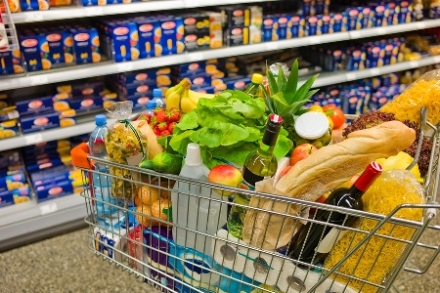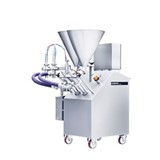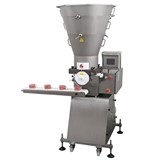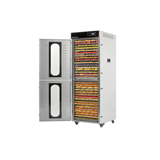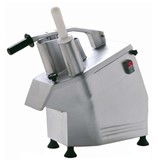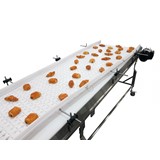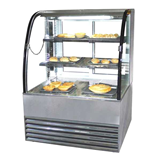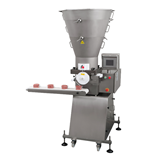Australia's food and beverage sector is no different to many other manufacturing businesses. A weak economic climate combined with a high dollar, rising input costs, and increased competition all make for the usual shopping list of manufacturing challenges.
However for the 7000-odd food and beverage processors in Australia another challenge looms just as large, an uncomfortable symbiosis with the people they need the most but trust the least, the supermarkets. In the last ten years Woolworths' share price has risen over 300 per cent.
The trajectory of its main competitor Coles is harder to map following Wesfarmers' takeover back in 2007, but it continues to be a star performer for the diversified group increasing revenues by five per cent in 2012-13 to nearly $36 billion.
By way of comparison, the entire food and beverage sector generates $82 billion in sales and service revenue per annum.
Wesfarmers said the Coles result came from "investing in better value", an ambiguous umbrella for the major supermarket retailers' strategy of price discounting major brands while at the same time ramping up their private label offers.
None of the food manufacturers IndustrySearch approached for comment were prepared to speak on the record, less evidence the problem doesn't exist, but rather fear of a backlash. One food manufacturer who has spoken up in the past is Heinz, with executives back in 2011 describing the Australian market as "an inhospitable environment for suppliers".
The Australian Food and Grocery Council (AFGC) is the peak body representing food and beverage manufacturers, and director of industry affairs, Samantha Blake, neatly summarised some of the pressures manufacturers faced in the AFGC's recent State of the Industry 2013.
"It has never been harder to build, sustain and grow a successful food and grocery business than it is today," Blake said.
"Traditional suppler-retailer relationships continue to be tense, with considerable influence applied by retailers to a broad range of key areas such as delivery requirements, packaging specifications, transport and stock management."
Andrew Palmer, Executive Director, Thought Leadership and Knowledge Management at research house Nielsen goes further.
"Grocery manufacturers face an ongoing pricing dilemma, driven by the fact the proportion of items
purchased on a price discount within the Australian supermarket has risen to 39.6 per cent," Palmer said.
"The pricing pressure on manufacturers is further magnified when this increasing promotional dependency is viewed in the context of the continued growth of private label brands which have now reached a share of 22.4 per cent.
"As price discounting narrows the gap between the prices paid for the traditional brands and retailers' own brands, it has never been more important for manufacturers to have a clear long-term strategy for value extraction.
"Without such a strategy, manufacturers can expect to face further difficulties as margin pressure forces tough decisions around business resourcing and brand development."
Dr Carol Richards is a sociologist working at the School of Social Science at the University of Queensland, and has conducted research on global food systems and the power relationships within them.
According to Dr Richards, there is a clear need for greater regulation around the concentration of power held by the major retailers, even though as she acknowledges, such regulation goes against the political grain in Australia.
"There is an issue of competition that hasn't been addressed, even though the competition commission has looked at this a number of times. It just seems either they've got no teeth, or their heart's not in it, or they are just not willing to accept that the way the supermarkets operate is quite often anti-competitive," Dr Richards told IndustrySearch.
"This is the same across the developed world. In the UK the Competition Commission found that any food retailer with more than eight per cent of market share had the ability to distort the market, and yet in Australia they've allowed 40 per cent as the benchmark and said it's not anti-competitive.
"We've got basically two supermarket chains with 75-80 per cent of the market and it's not a good situation. It's only good for the supermarkets."
Unsurprisingly it's a view the major retailers dispute, with Wesfarmers managing director Richard Goyder saying at the company's AGM only this month that any attempt to cap Coles and Woolworths market share would be "a sure fire recipe for higher prices for Australian consumers". Dr Richards has her doubts.
"It's a nice alarmist discourse to say that, but I think generally greater competition results in better prices, that's just basic logic," Dr Richards said.
"And supermarkets aren't so cheap. Supermarket prices went up in Australia something like 40 per cent more than any OECD country over a ten year period. We think we are getting cheap food but I'm not sure how cheap it really is."
The impact of the major retailers' power is felt upstream as well as down. As processors have their margins squeezed there is a temptation to find savings of their own through delaying investment in plant and machinery, a knock-on effect that has the potential to not only limit product development and innovation, but also to impact the suppliers of the machinery.
Heat and Control is a global company that designs and manufacturers food processing and packaging equipment from its plants in the US, China, India and here in Brisbane. The company's CEO – Asia Pacific, Europe and Africa is Jim Strang, a man with a long history in the food industry, and who has worked with Heat and Control for over 30 years.
As such Strang has seen it all, and believes food processors have a responsibility for their own success regardless of what challenges they may face, be it the high Australian dollar or the growing influence of the supermarkets.
"Not much has changed over the years, the problems haven't changed. The issues all of us have to improve are what can we do to make things better, and sitting on our hands is not going to do it. We have to find ways like the supermarkets have done. They've found ways of doing it," Strang told IndustrySearch.
"What all of us – it doesn't matter whether you are manufacturing machinery or manufacturing food products – we all have to become conscious of the efficiencies of scale we operate in. Manufacturers here have to find ways of getting better. Efficiency and output is extremely important."
It's a mantra Strang practices at Heat and Control, a company with a strong track record of innovation and technological development.
"We are in the business of helping processors take accountability for their own success. A lot of what we've done has been with high speed packaging, high speed processing, where you can take say a floor space and reduce it by half so your building costs are lower. You don't have as many machines therefore you don't have as many operators, so that's the kind of thing that we live and work with every day," Strang said.
For example the company has developed vacuum frying technology that not only reduces floor space, but also allows processors to cook at a lower temperature and eliminate the formation of acrylamide, a potentially hazardous chemical that can form in starchy foods during the cooking process.
The company has also recently developed a conveyor system called FastBack, allowing manufacturers of high flow rate products to benefit from the advantages of horizontal motion conveying, at the same time eliminating expensive seasoning waste as well as unscheduled downtime.
For Strang then, innovation, technology and a can-do attitude lies at the heart of the Australian food sector's future prospects, not worrying about supermarkets and the power they wield, something that is beyond the industry's control.
"We've worked with small companies who started off with a little line producing one level of goods, and we've seen those companies grow exponentially, and we've seen them grow into areas where they are taking business from some of the bigger players. That's somebody who has decided to do something," Strang said.
"The strong will survive, and the people who decide they are going to do something about it will do something about it. You have to just look inside a little harder, take advice, and find ways of making it happen."
- Suppliers
- New to IndustrySearch? Book a Demo
- Advertise with us
- Login
- Email Marketing
- Buyers
- Get Quotes
- Articles & Ideas
- Login
- Subscribe to newsletter
- My Details
- Get Quotes
- Automation & Control
- Automotive Workshop Equipment
- Commercial Cleaning Equipment & Supplies
- Construction Equipment & Heavy Machinery
- Conveyor Systems & Components
- Electrical & Power Generation Equipment
- Electronic Components
- Farming & Agriculture
- Food & Beverage Processing
- Forklifts & Forklift Attachments
- Hydraulic & Pneumatic Equipment
- Industrial Materials, Tools & Components
- Industrial Pumps
- IT Hardware & Industrial Computing
- IT Software & Applications
- Laboratory Equipment & Instruments
- Manufacturing & Industrial Equipment
- Material Handling & Lifting Equipment
- Metalworking & Machining
- Mining Equipment & Machinery
- Packaging & Labelling Machinery
- Pallet Handling Equipment
- Personal Protective Equipment
- Security & Surveillance
- Test & Measurement
- Transport & Logistic Equipment
- Warehouse Storage, Shelving & Racking
- Waste Treatment & Environmental Management
- Welding Machines & Accessories
- Woodworking & Joinery Machines
- Workplace Equipment
- Workplace Safety Equipment
- Get Quotes
- Automation & Control
- Automotive Workshop Equipment
- Commercial Cleaning Equipment & Supplies
- Construction Equipment & Heavy Machinery
- Conveyor Systems & Components
- Electrical & Power Generation Equipment
- Electronic Components
- Farming & Agriculture
- Food & Beverage Processing
- Forklifts & Forklift Attachments
- Hydraulic & Pneumatic Equipment
- Industrial Materials, Tools & Components
- Industrial Pumps
- IT Hardware & Industrial Computing
- IT Software & Applications
- Laboratory Equipment & Instruments
- Manufacturing & Industrial Equipment
- Material Handling & Lifting Equipment
- Metalworking & Machining
- Mining Equipment & Machinery
- Packaging & Labelling Machinery
- Pallet Handling Equipment
- Personal Protective Equipment
- Security & Surveillance
- Test & Measurement
- Transport & Logistic Equipment
- Warehouse Storage, Shelving & Racking
- Waste Treatment & Environmental Management
- Welding Machines & Accessories
- Woodworking & Joinery Machines
- Workplace Equipment
- Workplace Safety Equipment
Trusted by 1,000,000+ Australian industrial buyers
Buyers
- Discover products & solutions
- Login
- Subscribe To Newsletter
- Browse All Products
- Read Articles
Suppliers
Advertise
- Promote your products & solutions
- New to IndustrySearch? Book a Demo
- Login / Forgot Password
- Advertise Your Products
- Success Stories
- Email Marketing
- Suppliers
- Advertise with us
- Login
- Email Marketing
- Buyers
- Get Quotes
- Articles & Ideas
- Login
- Subscribe to newsletter
- My Details
Get Quotes
- Automation & Control
- Automotive Workshop Equipment
- Commercial Cleaning Equipment & Supplies
- Construction Equipment & Heavy Machinery
- Conveyor Systems & Components
- Electrical & Power Generation Equipment
- Electronic Components
- Farming & Agriculture
- Food & Beverage Processing
- Forklifts & Forklift Attachments
- Hydraulic & Pneumatic Equipment
- Industrial Materials, Tools & Components
- Industrial Pumps
- IT Hardware & Industrial Computing
- IT Software & Applications
- Laboratory Equipment & Instruments
- Manufacturing & Industrial Equipment
- Material Handling & Lifting Equipment
- Metalworking & Machining
- Mining Equipment & Machinery
- Packaging & Labelling Machinery
- Pallet Handling Equipment
- Personal Protective Equipment
- Security & Surveillance
- Test & Measurement
- Transport & Logistic Equipment
- Warehouse Storage, Shelving & Racking
- Waste Treatment & Environmental Management
- Welding Machines & Accessories
- Woodworking & Joinery Machines
- Workplace Equipment
- Workplace Safety Equipment
Get Quotes
- Automation & Control
- Automotive Workshop Equipment
- Commercial Cleaning Equipment & Supplies
- Construction Equipment & Heavy Machinery
- Conveyor Systems & Components
- Electrical & Power Generation Equipment
- Electronic Components
- Farming & Agriculture
- Food & Beverage Processing
- Forklifts & Forklift Attachments
- Hydraulic & Pneumatic Equipment
- Industrial Materials, Tools & Components
- Industrial Pumps
- IT Hardware & Industrial Computing
- IT Software & Applications
- Laboratory Equipment & Instruments
- Manufacturing & Industrial Equipment
- Material Handling & Lifting Equipment
- Metalworking & Machining
- Mining Equipment & Machinery
- Packaging & Labelling Machinery
- Pallet Handling Equipment
- Personal Protective Equipment
- Security & Surveillance
- Test & Measurement
- Transport & Logistic Equipment
- Warehouse Storage, Shelving & Racking
- Waste Treatment & Environmental Management
- Welding Machines & Accessories
- Woodworking & Joinery Machines
- Workplace Equipment
- Workplace Safety Equipment
Trusted by 1,000,000+ Australian industrial buyers

